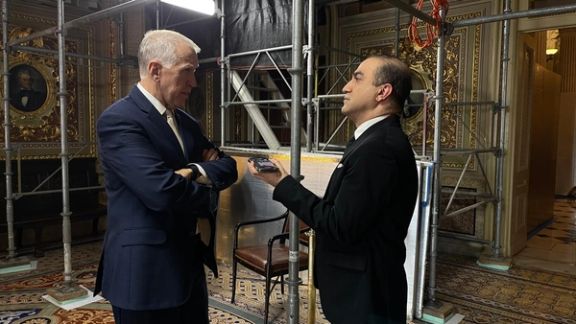US Lawmakers Demand Tougher Action Against Iran And Proxies

The Biden administration is receiving more and more criticism over its failure to deter Iran and its proxies in the Middle East since the Gaza war broke out in October.

The Biden administration is receiving more and more criticism over its failure to deter Iran and its proxies in the Middle East since the Gaza war broke out in October.
A marked increase in attacks by Iran-backed Houthis has been met by no US retaliation, leaving many lawmakers and officials in Washington confused and dismayed.
“We need to start holding them responsible,” Senator Thom Tillis told Iran International’s Arash Aalaei on Wednesday afternoon. “I think the administration needs to take a firmer stance because we all know that this is aided and abetted by Iran.”
In the past few days, two US destroyers, Carney and Mason, have been forced to engage in military action when they faced missiles and drones launched from territory controlled by Yemeni Houthis.
On Wednesday, the USS Mason intercepted and shot down a drone launched from a Houthi-controlled area. Three days earlier, USS Carney shot down three drones after it received distress calls from vessels that had come under attack from Iran-backed Houthis in the Red Sea.
“Every one of these drones and every one of these missiles that are launched at commercial vehicles are arguably acts of terrorism,” Senator Tillis said.
But the Biden administration seems to be reluctant to act on that basis, stating that it could not be established beyond doubt that the Houthi intended to target American warships.
Senior Biden administration officials are said to be against targeting Houthis for now, according to Politico, even though some military officers are calling for “more forceful responses to the militants’ attacks in the Red Sea.”
President Biden's critics say his lack of action against Iran has enabled and emboldened the regime and its proxies in the region. Many accuse Biden of pursuing a policy of “appeasement” with Tehran.
“The Biden administration has been funneling billions of dollars to the largest sponsor of terror,” Republican Senator Ron Johnson told Iran International’s Arash Alaei Wednesday. “The Biden administration’s weakness has inflamed the world.”
President Biden and his top team have been trying hard to avoid an expansion of the conflict since Hamas forces attacked Israel on 7 October. They seem to be concerned that the regime in Tehran would escalate through its proxies in Yemen, Lebanon, Syria, and Iraq, Politico reported.
More specifically, the US government seems to be concerned that targeting Houthis or even re-designating them as a terror group could jeopardize the Yemen peace process and perhaps the recent thaw between Iran and Saudi Arabia.
Many in Washington see emboldened attacks by Houthis as a direct result of the White House's decision to remove the group from the US terrorism blacklist in the first days of the Biden administration.
“The despicable acts of terrorism in the Red Sea show the recklessness of President Biden’s decision to de-list the Houthis as a foreign terrorist organization when he took office,” said Senator Roger Wicker, ranking member of the Senate Armed Services Committee.
“It is time to deliver a punishing, forceful response to Iran’s proxies throughout the region and re-list the Houthis,” he told the Daily Caller.
Since the beginning of the Israeli onslaught on Gaza, the Houthis have attacked several vessels in the Red Sea and launched drones and missiles towards Israel. But they had avoided direct conflict with the Americans – until last weekend.
This week’s incidents forcing US warships to engage has raised the stakes. Pointing out the failure of the current strategy to deter Iran and its proxies, the Republicans in the Congress are calling on the administration to react with more force.
With no clear end to the conflict in sight, it seems certain that foreign policy, in general, and the relationship with Iran, in particular, would become a hotly contested issue in the next year’s Presidential election.
“You know what WILL send Iran a message of deterrence,” asked Senator Roger Marshall on X, “firing Joe Biden in 11 months.”